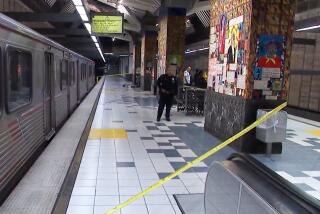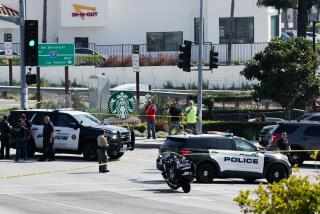Conservative worshipers prepare for their exodus
The people of St. Luke’s Anglican Church have called their La Crescenta parish home for 85 years. Generations of families have grown up within its historic stone walls.
On Sunday, the Rev. Rob Holman will deliver his final sermon there, an epitaph to a bruising legal fight the congregation waged and lost to practice its conservative brand of Christian theology and hold on to the church.
On Monday, St. Luke’s leaders will hand over its keys to the Episcopal Diocese of Los Angeles.
The diocese sued to retain St. Luke’s property after the congregation voted overwhelmingly in 2006 to leave it and the national Episcopal Church over theological differences, including the consecration of a gay bishop in New Hampshire.
After rounds of costly litigation, the courts ruled in the diocese’s favor, concluding that St. Luke’s property was held in trust for the diocese and the national church. Last week, a judge ordered St. Luke’s congregation to leave by Monday.
For those who were baptized and married and have mourned within its walls, the impending departure is liberating and heart-wrenching at once.
Many are relieved to be free from the distracting litigation of recent years but saddened by what they say will be an impending loss of fidelity to Scripture at their red-tiled church in the hills below the Angeles National Forest. Yet even as they prepare to begin anew in a rented chapel in nearby Glendale, many said they did not regret the legal battle.
“I cannot compromise my faith,” said senior warden Debbie Kollgaard, who heads the church’s vestry. “I think I can speak for a lot of people at the church: What I have is more important than any property.”
The bishop of Los Angeles, the Rt. Rev. J. Jon Bruno, has said that St. Luke’s, with its stone facade and stain-glassed sanctuary, always belonged to the Episcopal diocese, not its congregation. Bruno noted that the parish had been known as St. Luke’s of the Mountains Episcopal Church for most of its history.
On Monday, Bruno is scheduled to visit the church for the first time in three years, this time to accept its keys. The next Sunday, he will preside over worship services and install two new pastors.
“I offer reconciliation and open hands and open hearts to these people,” the bishop said. “We’re still moving forward, hoping people will come home.”
But it is not yet clear who will stay or who might return.
When the congregation voted to split with the diocese and Episcopal Church three years ago, about a quarter of St. Luke’s members left.
Many who departed found homes in other Episcopal congregations. Some say they are now waiting to see whom Bruno installs at St. Luke’s helm before deciding whether to come back. Few who left would speak publicly, saying the protracted court fight continues to stir bitterness in the tightknit La Crescenta community.
At least one former parishioner who was baptized at St. Luke’s said he plans to return, even though his family is choosing to remain at another church where they have worshiped for the last three years.
“After such a tumultuous period, there are bound to be major changes. I’m not expecting the same church I left,” said Charly Shelton, 20. “Whoever the rector is, I’m hoping the feeling of acceptance and love and trust comes back.”
The dispute at St. Luke’s is part of a larger conflict in the national Episcopal Church that has pitted theological liberals and conservatives against one another over issues of biblical authority and the role of gays in the church.
Last year, four breakaway Episcopal dioceses and dozens of parishes formed the rival Anglican Church in North America. St. Luke’s joined the new church last summer.
The exodus of traditionalist congregations has produced similar property disputes around the country, among them one in Fallbrook in the Episcopal Diocese of San Diego.
St. Luke’s experience could be a harbinger for three other former Episcopal churches in the region that also have waged losing legal battles over their property, diocese officials said.
This week, the U.S. Supreme Court declined to hear an appeal brought by one of those churches, St. James Anglican in Newport Beach, in its property rights dispute. The church has vowed to continue the fight in the trial court in Orange County.
In La Crescenta, St. Luke’s congregation must leave virtually everything behind for the diocese. Every item has been inventoried and cataloged.
In the days leading up to the turnover, there were few visible signs of change at the church. One, however, was unmistakable, contained in a message from the Book of Hebrews on the marquee out front. “You joyfully accepted confiscation of your property,” it read.
On Sunday, Holman plans to preach about its meaning, quoting from the remainder of the passage as he tells parishioners that their fight for their principles will bring “better and lasting possessions” -- a reference, he said, to Jesus.
“I’m sad that the Gospel we inherited as a church won’t be proclaimed here after we’re gone,” Holman said. “These walls have been hallowed by the word of God.”
--
More to Read
Start your day right
Sign up for Essential California for news, features and recommendations from the L.A. Times and beyond in your inbox six days a week.
You may occasionally receive promotional content from the Los Angeles Times.






